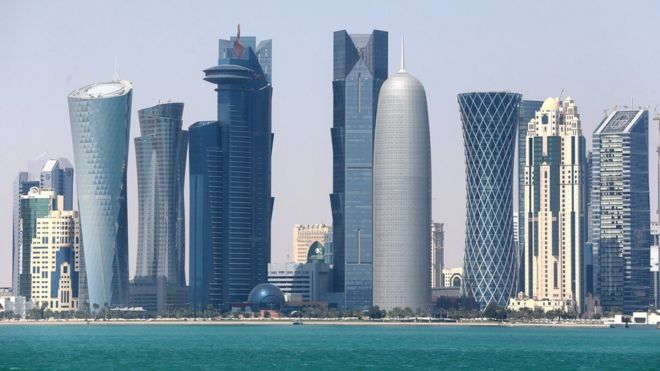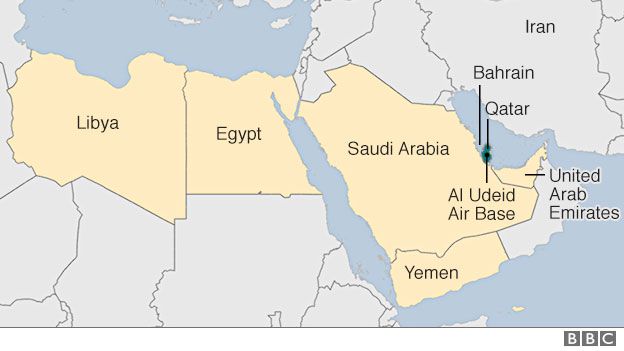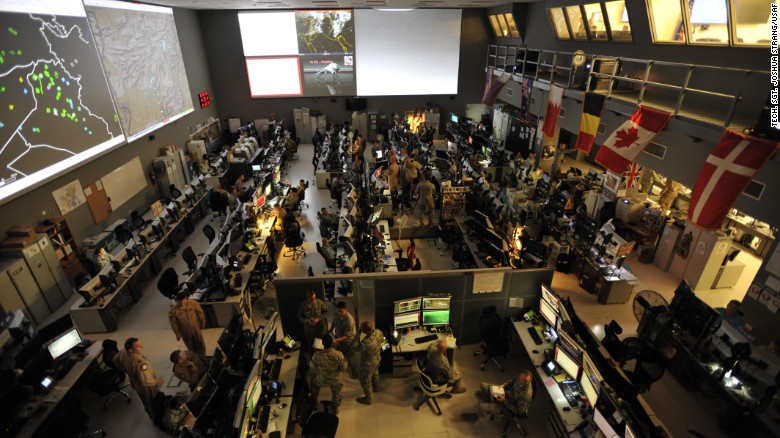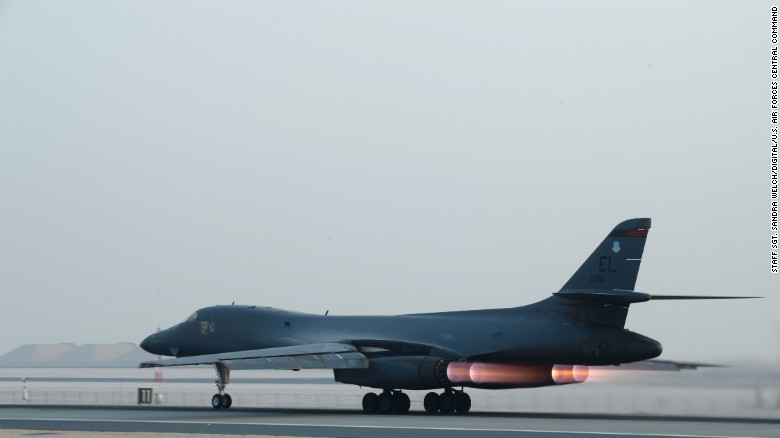Previously...on Homeland:
Qatar hacking row fuels Gulf tensions
By Neveen Youssef | May 25, 2017
Four Arab countries have blocked Qatari news websites following controversial comments attributed to the Qatari emir Sheikh Tamim bin Hamad Al Thani.
The website of the influential Al Jazeera network is among those now blocked by Saudi Arabia, United Arab Emirates, Egypt and Bahrain.
Qatar says the comments attributed to Sheikh Tamim were fake and appeared after hackers took control of the state news agency website.
Online users in the four countries have confirmed they could not access the websites.
Praising Iran
The disputed statement touched on many sensitive regional issues, but above all, praised Saudi Arabia's arch-rival Iran and carried thinly-veiled criticism of the kingdom.
In the report, Sheikh Tamim was quoted as saying: "There is no reason behind Arabs' hostility to Iran and our [Doha's] relationship with Israel is good."
The statement also had favourable words about the Lebanese Shia militant movement Hezbollah, a close ally of Iran.
Saudi media continued to report the comments even after Qatar said they had been "fabricated".
Qatari Foreign Minister Mohammed bin Abdulrahman Al Thani said his country will sue the perpetrators of the hacking attack, and described the incident as part of a "media campaign" against his country.
Pan-Arab Sky News Arabia TV has aired video footage apparently taken from Qatari TV in which the controversial comments appeared in a screen caption.
Regional tensions
The incident comes after participants at Sunday's Arab-Islamic-US summit in Riyadh unleashed a wave of condemnation of Shia-led Iran, blaming it for spreading terrorism and criticising its interference in the region.
Sunni-ruled Bahrain is currently facing internal unrest among its majority Shia population. It has banned Wefaq, the main Shia opposition group in the country, and stripped top cleric Isa Qassim of his Bahraini nationality, prompting protests and violence.
Tensions between Qatar and other Arab states came to the fore following the ousting of Egyptian Islamist President Mohammed Morsi by the army in July 2013.
Official media outlets in several Gulf States have repeatedly expressed dissatisfaction with Qatar's alleged support of the Egyptian Muslim Brotherhood (MB) group - of which Morsi was a member - and Hezbollah, which some Arab countries designate as terrorist organisations.
In March 2014, Saudi Arabia, Bahrain and the UAE withdrew their ambassadors from Qatar in protest over Doha's alleged interference in their affairs.
Announcing the ban this week, Egypt accused Al Jazeera of "inciting terrorism" and "fabricating news".
'Tool of Qatar'
Qatar's financial clout and regional influence brought about by the popularity of Al Jazeera have long been of concern to Gulf neighbours.
Saudi Arabia, historically the uncontested leader of the six-nation Gulf Cooperation Council, has sponsored several agreements with the Qatari government to rein in its media arms.
The coverage of the Doha-based pan-Arab network shows some inclination towards Islamists in Egypt and describes the ousting of Morsi by the military as a "coup".
Egyptian security officials have also cracked down on Al Jazeera journalists working in Egypt.
The channel is the most widely watched in the Arab world and portrays itself as a fearless bastion of objective journalism.
However critics say it is a tool of Qatari foreign policy and will rarely challenge the interests of its backers.
http://www.bbc.com/news/world-middle-east-40046782
...and now, the continuation:
Qatar row: Arab countries cut diplomatic ties with Doha
June 4, 2017
A number of Arab countries including Saudi Arabia and Egypt have cut diplomatic ties with Qatar, accusing it of destabilising the region.
They say Qatar backs militant groups including so-called Islamic State (IS) and al-Qaeda, which Qatar denies.
The Saudi state news agency SPA said Riyadh had closed its borders, severing land, sea and air contact with the tiny peninsula of oil-rich Qatar.
Qatar called the decision "unjustified" and with "no basis in fact".
The unprecedented move is seen as a major split between powerful Gulf countries, who are also close US allies.
It comes amid heightened tensions between Gulf countries and their near-neighbour, Iran. The
Saudi statement accused Qatar of collaborating with "Iranian-backed terrorist groups" in its restive eastern region of Qatif and in Bahrain.
What has happened?
The diplomatic withdrawal was first put into motion by
Bahrain, then
Saudi Arabia, the
United Arab Emirates (UAE),
Egypt,
Yemen,
Libya's eastern-based government and the
Maldives all followed suit.
SPA cited officials as saying the decision was taken to "protect its national security from the dangers of terrorism and extremism".
Saudi Arabia, the UAE and Bahrain have given all Qatari visitors and residents two weeks to leave their territory. The three countries have also banned their citizens from travelling to Qatar.
However, Saudi Arabia says it will still allow Qataris to take part in the annual Hajj pilgrimage to Mecca.
So far, there has been no sign of reciprocal moves by Qatar.
In the latest developments:
- The UAE and Egypt have given Qatari diplomats 48 hours to leave both countries
- Airlines from many of the affected countries, including EgyptAir, Etihad Airways and Emirates, said they are to cancel flights to and from the Qatari capital Doha
- The Gulf allies said they had closed their airspace to Qatar Airways, which has suspended all its flights to Saudi Arabia
- Bahrain's state news agency said it was cutting its ties because Qatar was "shaking the security and stability of Bahrain and meddling in its affairs"
- The Saudi-led Arab coalition fighting Yemen's Houthi rebels also expelled Qatar from its alliance because of its "practices that strengthen terrorism" and its
Why has this happened?
While the severing of ties was sudden, it has not come out of the blue, as tensions have been building for years, and particularly in recent weeks.
Two weeks ago, Egypt, Saudi Arabia, Bahrain and the UAE
blocked Qatari news sites, including Al Jazeera. Comments purportedly by Qatari Emir Sheikh Tamim bin Hamad al-Thani criticising Saudi Arabia had appeared on Qatari state media.
The government in Doha dismissed the comments as fake, attributing the report to a "shameful cybercrime".
Back in 2014, Saudi Arabia, Bahrain and the UAE withdrew their ambassadors from Qatar for several months in protest over alleged interference in their affairs.
More broadly, two key factors drove Monday's decision: Qatar's ties to Islamist groups, and the role of Iran, Saudi Arabia's regional rival.
While Qatar has joined the US coalition against IS, the Qatari government has repeatedly denied accusations from Iraq's Shia leaders that it provided financial support to IS.
Wealthy individuals in the country are believed to have made donations and the government has given money and weapons to hardline Islamist groups in Syria. Qatar is also accused of having links to a group formerly known as the Nusra Front, an al-Qaeda affiliate.
The SPA statement accused Qatar of backing these groups, as well as the Islamist Muslim Brotherhood - banned in Gulf countries as a terrorist organisation - and that it "promotes the message and schemes of these groups through their media constantly".
Saudi Arabia itself is a key backer of Islamist rebels, including hardline jihadist groups, in Syria.
What has been the reaction?
Qatar, which is due to host the football World Cup in 2022, was critical of the decision. The foreign ministry said the decisions would "not affect the normal lives of citizens and residents".
US Secretary of State Rex Tillerson, speaking in Sydney, urged the countries to resolve their differences through dialogue.
Iranian foreign ministry spokesman Bahram Qasemi said there was a need for "transparent dialogue and diplomacy", adding: "No country in the region will benefit from the heightened tension."
Qatar's stock market closed down 7.27%.
One of the likely knock-on effects
is on food stability: about 40% of Qatar's food is believed to come by lorry from Saudi Arabia.
The Doha News newspaper
reported that people had rushed to supermarkets to stock up on food and water.
Nearly 90% of Qatar's population are migrant workers, many of whom are working on the construction boom fuelled by the successful World Cup bid.
http://www.bbc.com/news/world-middle-east-40155829






